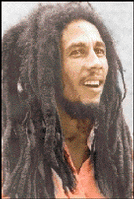
Marley By Clyde McKenzie,
Contributor
RECENTLY, WE celebrated the birth of Robert Nesta Marley and as a people we sought to draw valuable lessons from what was truly a remarkable, but brief life. A number of symposia, seminars and talk shows devoted much time and apparently very little reason to the task of assaying the significance of this truly remarkable life.
What was clear from most of the discussions about Marley was that there was scarcely the will to extract the essential lessons from a life which should serve as an inspiration to any boy or girl on that arduous course of self realisation.
However, to glean these important lessons we need to ask the right questions, a task many who participated in the discussions on Marley clearly avoided.
There are many who laud the revolutionary character of Marley's music, pointing out that we lack the level of songwriting today so evident in his music. It must be noted, however, that Marley operated in a time of great social upheaval. Imperialism, Colonialism, Apartheid and Black Nationalism were burning issues.
Marley's great revolutionary works were forged in an historical context. Would the circumstances today have inspired Marley to fashion the lofty messages, which he did in the 1970s? Would he have presented his views in the same fashion today as he did in that era?
What were the overriding influences and concerns at the various stages of his artistic odyssey? What inspired the changes? Why did he not enjoy greater sales figures in his lifetime? How did Marley's mixed heritage help or retard efforts to market him and his music?
Was Marley's broad appeal based on the fact that he was a country boy who grew up in the city and that he reflected that reality? Why didn't he have more hits on Jamaican radio? What were the distinctive features of the Marley persona which made him standout among such other great talents as Tosh, Wailer, Toots and Jimmy Cliff? Could Marley have made it without Island Record and Blackwell?
What was the role of Rita Marley in all of this? She was critical to the distribution of the music in the early days and according to legend she would ride her bicycle to get the records out. How important a muse was she and has she been sufficiently credited for the various roles she has played? It has been reported that she initiated his conversion to Rastafari. But for sure, it was through Rastafarianism that the world has come to know Bob.
How well have we handled Marley's legacy? Why didn't Universal studios seek to have its Bob Marley theme park in Jamaica?
What steps are being taken to ensure that Tuff Gong becomes the kind of international powerhouses that Bob envisioned? What about the Marley children and their role in advancing their father's legacy? These children must be commended, especially Stephen Marley who has attempted to cement Bob Marley into the current Black American urban music experience by introducing new interpretations of his father's work. Some pundits think Bob Marley should not be tampered with. But history will absolve the young Marley.
If we ask the right questions we may be able to spot the next Marley in out midst. Does the next Marley have to be a musician or could he come from the field of computing?









































